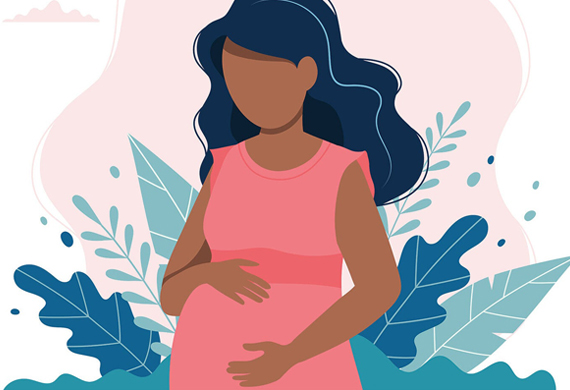
Indian government joins hands with WHO to tackle the problem of anaemia among pregnant women
By: WE Staff | Thursday, 2 December 2021
With the support of the World Health Organisation (WHO), the Indian government is working closely to tackle the problem of anaemia that affects more than 50 per cent of pregnant women in the country.
Dr Bharati Pravin Pawar, minister of state for health and family welfare, told Parliament, “According to recently released National Family Health Survey V data, 52.2 per cent pregnant women in India, who are in the age group of 15-49 years, are estimated to be anaemic.”
With Ladakh, Bihar and Gujarat seeing the highest percentages 78.1 per cent, 63.1 per cent and 62.6 per cent respectively, she pointed out that the issue is prevalent across the country. In contrast Arunachal Pradesh, Nagaland and Lakshadweep have the lowest percentages, 27. 9 per cent, 22.9 per cent and 20.9 per cent respectively.
The Centre has taken measures to tackle the problem, Dr Pawar informed Parliament. “In 2018, the government launched the ‘Anaemia Mukt Bharat’ strategy with the aim to reduce anaemia among women, children and adolescents,” she said.
The mission includes multiple measures such as addressing non-nutritional causes of anaemia, testing for anaemia using digital methods and managing causes of severe anaemia in pregnant women through IV iron sucrose treatment or blood transfusion.
Between the periods spanning 2015-16 and 2019-2021, the data from the survey shows a 1.8 per cent increase in the number of pregnant women reported to be anaemic, in the age group of 15-49 years.
Most Viewed
- 1 Women's Health Startup HerMD Closing Doors Amid Industry Challenges
- 2 5 Famous Women in Indian Armed Forces
- 3 Saudi Women No longer Require Male Permission for Clothing Choices, says Prince MbS
- 4 Kolkata Medtech Startup Innovodigm Raises Rs 5.5 Crore Seed Funding Led by IAN Group
- 5 Yamunanagar's Kashish Kalra Honoured after Securing 111th Rank in UPSC Civil Services Exam
- 6 Madurai Appoints Its First Woman Corporation Head
- 7 IAS Vijayalakshmi Bidari Appointed as the new Nagpur Divisional Commissioner
- 8 American Entrepreneur Lucy Guo Overtakes T Swift to become Youngest Female Billionaire
- 9 ICC Women's World Cup 2025 Trophy Showcased at Indore's Holkar Stadium
- 10 Aparna Saxena's Beauty Venture AntiNorm Launches in India
- 11 Vidya Nataraj Co-Founded BlueStone Jewellery & Lifestyle files IPO
- 12 5 Women Freedom Fighters of India
- 13 Dr. G Krishnapriya appointed as CEO for Trichy
- 14 M3M & Sirona Partner to Introduce Menstrual Hygiene Vending Machines in 15 Locations
- 15 Punjab Govt launches SHE Cohort 3.0 Supporting Tech-led Women Startups
- 16 Indian origin Lawyer, Sweena Pannu appointed as the US New Superior Court Judge
- 17 The Aurora Tech Award recognizes 4 Indian Women-led Startups
- 18 Kerala's Republic Day parade featured an all-female tableau
- 19 Manisha Kabbur Becomes Karnataka's First Woman International Karate Coach
- 20 Director K. S. Ravikumar's Daughter Maalica Ravikumar Launches Life Coaching Company 'Evergrowth Academy' for Women
- 21 Leezu's Raises Pre-Seed Funding to Accelerate Growth in Sexual Wellness Industry
- 22 Sattu: Super-easy summer drink for PCOS gut healing
- 23 Swathi Nelabhatla creates Sitha App, India's First Women-Exclusive Gig Platform
- 24 7 Timeless Female Kathak Dancers & their Iconic Legacies
- 25 Meet 7 Iconic Women Architects of Modern India & their Most Impactful Work
- 26 This Woman-led Insuretech Startup is Helping Bridge the Education Financing Gap in India
- 27 Women Leaders Share Lessons Learnt from India Women's WC Win
- 28 5 Enterprising Women Founders Powering Singapore's Tech & Innovation Landscape
- 29 4 Women. 4 Stories. One Vision for Smarter, Stronger Healthcare
- 30 Global Gender Gap Narrows to 68.8%, But Full Equality 123 Years Away: WEF Report 2025
- 31 Changemakers: 7 Women Entrepreneurs Taking the Make in India Movement Forward
- 32 Meet Lucy Guo, The Youngest Self-Made Female Billionaire Disrupting Tech
- 33 How Women are Driving India's Festive Online Shopping Surge






